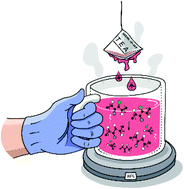Dewar lactone as a modular platform to a new class of substituted poly(acetylene)s†
Abstract
A variety of 3-substituted-4-halocyclobutenes originating from Dewar lactone (2-oxabicyclo[2.2.0]hex-5-en-3-one) were synthesized and polymerized using the Hoveyda–Grubbs 2nd generation catalyst. The polymerization reactions were found to proceed in a controlled manner, which provided a means to tune polymer molecular weight and to effect chain extensions. Treating the polymers with an organic base (e.g., triethylamine) facilitated elimination and afforded the corresponding substituted poly(acetylene)s which featured substituents on every four carbon atoms along the polymer backbone. The polymers were characterized using gel permeation chromatography and a variety of different spectroscopic techniques (i.e., NMR, FT-IR, UV-vis, and Raman). The physical, chemical, and electronic properties of the polymers were found to be dependent on the pendant substituents.



 Please wait while we load your content...
Please wait while we load your content...